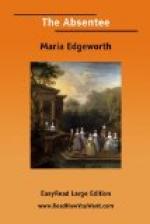He will oblige you, but he will not obey you; he will do you a favour, but he will not do you justice; he will do anything to serve you, but the particular thing you order he neglects; he asks your pardon, for he would not, for all the goods in his warehouse, disoblige you; not for the sake of your custom, but he has a particular regard for your family. Economy, in the eyes of such a tradesman, is, if not a mean vice, at least a shabby virtue, which he is too polite to suspect his customers of, and particularly proud to prove himself superior to. Many London tradesmen, after making their thousands and their tens of thousands, feel pride in still continuing to live like plain men of business; but from the moment a Dublin tradesman of this style has made a few hundreds, he sets up his gig, and then his head is in his carriage, and not in his business; and when he has made a few thousands, he buys or builds a country-house—and then, and thenceforward, his head, heart, and soul are in his country-house, and only his body in the shop with his customers.
Whilst he is making money, his wife, or rather his lady, is spending twice as much out of town as he makes in it. At the word country-house, let no one figure to himself a snug little box, like that in which a warm London citizen, after long years of toil, indulges himself, one day out of seven, in repose—enjoying from his gazabo the smell of the dust, and the view of passing coaches on the London road. No: these Hibernian villas are on a much more magnificent scale; some of them formerly belonged to Irish members of Parliament, who are at a distance from their country-seats. After the Union these were bought by citizens and tradesmen, who spoiled, by the mixture of their own fancies, what had originally been designed by men of good taste.
Some time after Lord Colambre’s arrival in Dublin, he had an opportunity of seeing one of these villas, which belonged to Mrs. Raffarty, a grocer’s lady, and sister to one of Lord Clonbrony’s agents, Mr. Nicholas Garraghty. Lord Colambre was surprised to find that his father’s agent resided in Dublin: he had been used to see agents, or stewards, as they are called in England, live in the country, and usually on the estate of which they have the management. Mr. Nicholas Garraghty, however, had a handsome house in a fashionable part of Dublin. Lord Colambre called several times to see him, but he was out of town, receiving rents for some other gentlemen, as he was agent for more than one property.
Though our hero had not the honour of seeing Mr. Garraghty, he had the pleasure of finding Mrs. Raffarty one day at her brother’s house. Just as his lordship came to the door, she was going, on her jaunting-car, to her villa, called Tusculum, situate near Bray. She spoke much of the beauties of the vicinity of Dublin; found his lordship was going with Sir James Brooke and a party of gentlemen to see the county of Wicklow; and his lordship and party were entreated to do her the honour of taking in his way a little collation at Tusculum.




